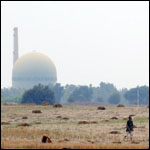A Criteria-Based Approach to Nuclear Cooperation With Pakistan Toby Dalton, Mark Hibbs and George Perkovich | Carnegie Policy Outlook
In the wake of the Fukushima nuclear disaster, Beijing decided to review its plans for expanding nuclear power in China. It appears likely that China will shift its ambitious nuclear construction program away from older designs to modern technology provided by foreign vendors. Although there are no indications that China is reconsidering its decision to build two additional nuclear power reactors in Pakistan—which are based on technology Beijing will probably abandon domestically—the accident in Japan provides Beijing with an opportunity to pause and contemplate conditioning its cooperation with Pakistan on improvements in nuclear safety and security.
|
|
David Albright and Andrea Stricker | ISIS
On June 21, Iran's atomic energy chief, Fereydoun Abbasi-Davani, in a speech to the International Atomic Energy Agency (IAEA) conference on nuclear safety in Vienna, held to review safety standards in the wake of the Fukushima disaster, indicated that Iran is in no hurry to join the international Convention on Nuclear Safety. Abbasi-Davani said that Iran has started the process of ratifying the pact, but that it would first need to consider whether or not it conflicts with its rights. Iran is the sole country with a significant nuclear power program that has not signed the 1994 convention. Full Article
Asahi Shimbun
A troubled water purification system at the Fukushima No. 1 nuclear power plant has processed about 1,825 tons of radioactive water, Tokyo Electric Power Co. said on June 22. A series of malfunctions have plagued the system since it was installed at the start of June, but TEPCO said continued testing of the equipment had brought radiation levels in the processed water to about 1/100,000th of original levels. The total volume of contaminated water on the plant's site has been reduced. Full Article
Elaine M. Grossman | Global Security Newswire
The U.S. Senate Armed Services Committee last week issued new legislation that echoes questions about President Obama's nuclear weapons strategy initially raised last month in the House. The fiscal 2012 defense authorization bill approved unanimously by the panel calls for a presidential report "describing any new nuclear employment strategy if and when such a strategy is issued," according to a Senate committee release. Full Article
World Nuclear News
The UK's finalised Energy National Policy Statements (NPS), which set the stage for planning decisions on energy infrastructure projects including nuclear, have been formally published ready for debate in parliament.The publication of the NPSs is the culmination of a process that began with a consultation on six draft statements for energy infrastructure, which ran from November 2009 to February 2010. A formal response had been expected later that year but following UK general elections in May 2010 the country's coalition government subsequently decided to launch a further consultation in October 2010. The relaunched consultation closed on 24 January 2011 after receiving over two and a half thousand responses. Full Article
Global Security Newswire
Russia on Tuesday voiced objection to the presence of a U.S. warship equipped with ballistic missile defense technology in neighboring Georgia, saying the matter undermined the diplomatic "reset" between the two former Cold War opponents, Agence France-Presse reported. The USS Monterey docked at a Georgian port in order to take part in three-day training event with local coast guards. The Aegis-equipped naval cruiser is deployed to Europe as part of of the Obama administration's "phased adaptive approach" to European missile defense. Russia has questioned why the warship is in the Black Sea if missile attacks are feared from the Middle East, further south. Full Article
|

